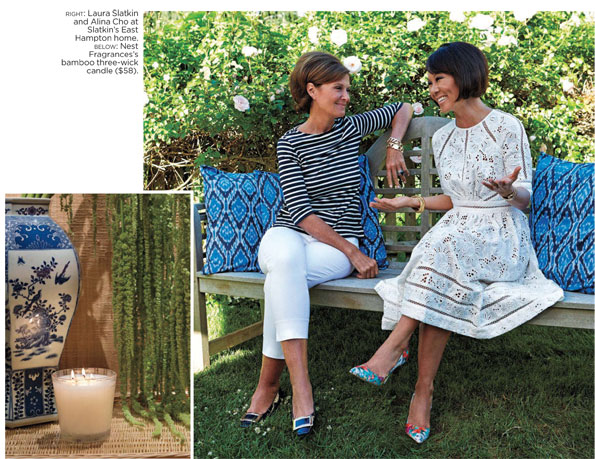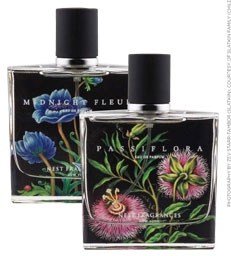PORTFOLIO COMPANY NEWS

Business Scents
Celebrating the success of her NEST Fragrances line, East Hampton Resident Laura Slatkin sits down with Alina Cho to discuss her growing company, her philanthropic efforts, and life on the East End.
 Take one look at my good friend Laura Slatkin
and the word that immediately comes to
mind is "lady." With her trademark bouffant
hair and feminine floral dresses, Laura doesn't so
much walk as she does glide across a room—pure
elegance with manners to match. But looks, as they
say, can be deceiving. Slatkin is also a powerhouse
executive and dedicated philanthropist. As
founder and CEO of Nest Fragrances, this former
Wall Street banker has built an empire of candles
and fine perfumes. Body creams and a Manhattan
flagship store are next on her to-do list.
When she's not running her company, Laura, a
wife and mother of two children, is fundraising and
building programs for autism awareness—a passion
born out of her desire to enhance the lives of
those affected by the disorder, including her own
son, David, who is severely impaired. Here she
talks about her beloved summers in the Hamptons,
how the East End inspires her, and how family
makes it all worthwhile.
Take one look at my good friend Laura Slatkin
and the word that immediately comes to
mind is "lady." With her trademark bouffant
hair and feminine floral dresses, Laura doesn't so
much walk as she does glide across a room—pure
elegance with manners to match. But looks, as they
say, can be deceiving. Slatkin is also a powerhouse
executive and dedicated philanthropist. As
founder and CEO of Nest Fragrances, this former
Wall Street banker has built an empire of candles
and fine perfumes. Body creams and a Manhattan
flagship store are next on her to-do list.
When she's not running her company, Laura, a
wife and mother of two children, is fundraising and
building programs for autism awareness—a passion
born out of her desire to enhance the lives of
those affected by the disorder, including her own
son, David, who is severely impaired. Here she
talks about her beloved summers in the Hamptons,
how the East End inspires her, and how family
makes it all worthwhile.
Alina Cho: We've been friends a long time.
Laura Slatkin: Totally.
AC: I always say I forget how a ccomplished my friends are because we're friends. I did a little research and discovered that the first interview I ever did with you was in 2006 for CNN. You spoke so candidly about what it was like to be a parent living with an autistic child. I believe it was the first substantive story done on television about autism.
LS: Absolutely, and it was so timely. You were right on the cusp of a major movement that was just beginning in the field of autism.
AC: Then you started your business.
LS: We launched in 2008, which was not a good time to start a company. It was one of the worst years.
AC: The economy was collapsing. What were you thinking at that point?
LS: It didn't stop us—we were so excited to launch. We started out at Bergdorf Goodman and Neiman Marcus, and that Monday after the first weekend we sold a thousand candles—and that was before any of the stores were trained. So what did that mean? The brand had shelf appeal, and that's one of the greatest gifts any label can have. That means nobody has to be standing there selling it, nobody needs to know anything about it—something about the name, the packaging, and the presentation draws the customer over. Once the customer is engaged, the quality of the product does the rest.
AC: It resonates.
LS: Yes. And when you have that, you have something really special.
 AC: In 2012, you launched fine fragrances. What
made you decide to get into that market?
AC: In 2012, you launched fine fragrances. What
made you decide to get into that market?
LS: I was in my library and I was flipping through the pages of this book on Mrs. Mary Delany, an 18th-century artist, and I came across one of her botanicals. I was so moved by the beauty of it that I ripped the page right out of the book and wrapped it around a small box, put it down, and said, "Oh, my gosh, that is so beautiful." Then I commissioned a brilliant Russian artist to create three paintings for me based on Mrs. Delany's work. I took those works to master perfumers, and they were inspired by the paintings to create extraordinary fragrances. The entire journey was steeped in art and creativity.
AC: How are they priced?
LS: The small bottle is $65 and the rollerball is $30. Throw it right in your pocketbook. It's nice to freshen up your fragrance like you would your lipstick. Often I'll dab my pulse points at the table.
AC: When you moved into fragrances, it was considered a big deal because it makes a strong statement that you're moving beyond home essences.
LS: That's the draw, to create a luxury lifestyle beauty brand. I had been asked for years to enter this space. We launched our fragrances at Sephora, where we're now one of the top-selling brands. Then we went on QVC and sold a quarter of a million dollars in 10 minutes. So the brand's a real hit in this category.
AC: I am always so fascinated by fragrance sales on television, because you can't smell it, so it really is about how it makes you feel.
LS: Right. I like to talk about fragrance in terms of "When do I want to wear this scent?" Fragrance is all about mood. So Midnight Fleur is a very sexy, sensual fragrance that you would wear in the evening.
AC: That's how I want to feel.
LS: What woman doesn't? Then there's Passiflora, which you would wear if you were going to lunch with girlfriends or when you want to feel feminine and pretty. Some of the summer scents, like our bamboo candle, are inspired by our beach house here in East Hampton. We have bamboo growing on our property around the pool and the pond.
AC: Let's talk about your commitment to philanthropy. We met in 2005, around the time you were opening the first state-of-the-art New York City charter school for children with autism. You saw through your own experience with your son that there was a need for this, right?
LS: Yes. All the exceptional schools were in New Jersey, and Harry [Slatkin, Laura's husband] and I thought that was crazy. That's what led us to open a charter school, and we thought it should be part of the New York City public school system, because that's where we needed to make an impact.
AC: David is now living in a facility near Boston. How is he doing? You see him once a month?
LS: Once to twice a month. He comes to East Hampton. He loves it out here, and we love seeing him. He swims in the ocean, he swims in the pool, he goes for long walks to town and back. It's a routine. We take him out to the Lighthouse at Montauk Point, and then we come back and go for lobster rolls. It's fun when he's in a good mood. But when he isn't, it's tough—he's up all night.
AC: He's 15 years old, yet he has never said a word.
LS: Not one, ever. Not a single word. If you have a kid who is so impaired, who can't talk, who has aggressive behaviors, who's cognitively so weak he can't learn a consistent sign for "I have to go to the bathroom" or "I'm hungry," and you realize that because of his aggression he needs two or more people around him all the time, it's very hard. We speak candidly about how severely affected our child is because we want people to know how extremely challenging and difficult it can be.
AC: Will we find a cure for autism in our lifetime?
LS: Probably not. It's a very complex brain disorder. But we will be able to detect it earlier and improve the lives of those affected by autism. For example, we just completed building the Center for Autism and the Developing Brain with New York-Presbyterian Hospital, Weill Cornell Medical College, and Columbia University. This institute will support individuals with autism across their lifespan. This is why philanthropy is addictive— you see what an impact you can make in people's lives. We started our philanthropic work with autism, but when something else pops into our family, we do our research and we dive into it. There's so much to address with so many different mental health disorders. It's exciting to build things, move a field forward, and make progress.
AC: And after you work that hard, you need a place to unwind.
LS: Yes, and that's exactly where East Hampton comes in.